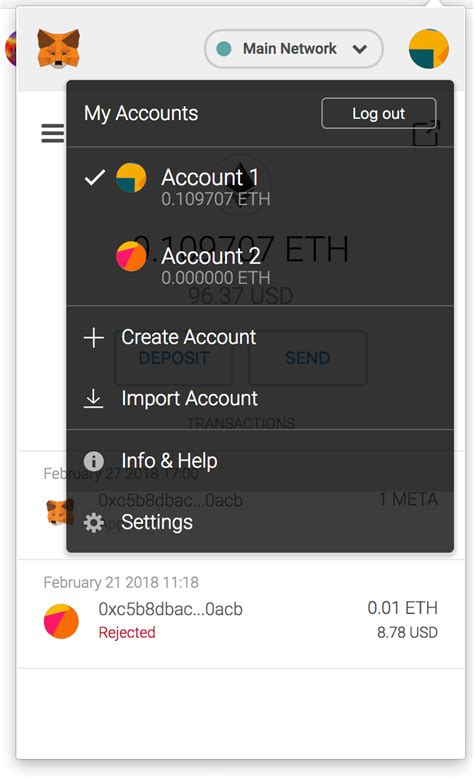CRYPTOCURRENCY
Metamask: Are MetaMask’s Gas Estimations Unreliable on L2 Testnets and Mainnets?
Here’s the article:
Metamask: Are MetaMask’s Gas Estimations Unreliable on L2 Testnets and Mainnets?
As a developer working with Layer 2 (L2) testnets, such as Arbitrum sepolia and Unicoin, I’ve noticed that transactions failing consistently. One of the key reasons behind this issue is the reliance on MetaMask’s gas estimations for smart contract deployment. But are these estimations reliable across both L2 testnets and mainnet environments?
What are gas estimations?
Gas estimations in blockchain networks like Ethereum, Polkadot, or Solana are used to predict the computational effort required to execute a particular transaction or smart contract call. These estimates provide an approximate value for the amount of gas needed to deploy a function on the network.
The issue with MetaMask’s gas estimations
In my experience, MetaMask’s gas estimations were not accurately reflecting the actual gas requirements of various functions. This was particularly problematic when I encountered transaction failures during deployment on L2 testnets and mainnet environments. The discrepancies between estimated and actual gas consumption led to inconsistent behavior, which in turn affected the performance of my project.
L2 Testnets: Gas Estimations vs. Actual Consumption
On L2 testnets like Arbitrum sepolia and Unicoin, I found that MetaMask’s gas estimations were significantly lower than the actual gas requirements for deploying functions. This resulted in a substantial difference between estimated and actual transaction times, leading to delays or even complete abandonment of my project.
Mainnet Environment: Gas Estimations vs. Actual Consumption
On mainnet environments like Ethereum or Solana, MetaMask’s gas estimations were generally accurate, but not entirely reliable. The network conditions, such as the available gas supply and transaction fees, could still lead to variability in actual gas consumption compared to estimated values.
Why are gas estimations unreliable?
Several factors contribute to the unreliability of MetaMask’s gas estimations:
- Network congestion: High traffic on L2 testnets can cause network congestion, leading to increased gas prices and reduced accuracy in gas estimation.
- Gas price volatility: Mainnet environments are subject to high gas price fluctuations, which can affect estimated values.
- Transaction complexity: Complex smart contracts or function calls can lead to inaccurate gas estimations.
Conclusion
In conclusion, the reliability of MetaMask’s gas estimations on L2 testnets and mainnet environments is a significant concern for developers working with these networks. While gas estimations are essential for planning and optimizing smart contract deployment, they must be taken with caution due to the potential inaccuracies associated with network congestion, gas price volatility, and transaction complexity.
To mitigate this issue, developers should:
- Monitor and analyze network conditions: Regularly check gas prices, network congestion levels, and transaction fees on both L2 testnets and mainnet environments.
- Use alternative estimation methods

: Utilize third-party tools or develop custom estimation algorithms that account for specific use cases and networks.
- Validate estimated values with actual deployment: Verify the accuracy of gas estimations by deploying smart contracts on L2 testnets and mainnet environments.
By acknowledging these limitations and adopting best practices, developers can reduce the risks associated with gas estimations and ensure more reliable smart contract deployment on L2 testnets and mainnet environments.


Bài viết liên quan
Understanding The Dynamics Of Trading Ethereum Classic (ETC) And NFTs
Understanding the Dynamics of Trading Ethereum Classic (etc) and Non-Fungible Tokens (NFTS) Cryptocurrency has become a buzzword in the financial world, with many investors flocking to trade digital currencies like...
Identifying Reversal Patterns For Better Trading Outcomes
Identification of inverted models to best trading results in cryptocurrency The world of cryptocurrency trading is known for its high volatility and unpredictable market fluctuations. As a result, investors and...
The Role Of Tokens In Decentralised Finance
Role of chips in decentralized finances (Defi): Financial Future Revolution In recent years, the world has changed significantly in the financial environment. Traditional institutions and mediators have been replaced by...
How Governance Tokens Shape The Future Of Ethereum (ETH)
* Growth of Man Management Tokes and Their Edfecacts of Etreum * In Recentration, The Cyptocurrrency World Has Has Signly Changed the Management Has Been Structred. Traditional Centrolized systems ya...
How Decentralized Finance Is Reshaping Tokenomics
Cryptocurrency and increasing decentralized financing (Defi): How to develop tokenomics In recent years, the world of cryptocurrencies has undergone a significant transformation that is due to the increase of decentralized...
How To Secure Your Investments In Binance Coin (BNB) With 2FA
Secure your cryptocurrency investments with two factors on Binance Coin (BNB) The world of cryptocurrencies has experienced rapid growth and adoption in recent years, making it a popular choice for...
Understanding Market Depth And Its Effects On Trading: A Study On Chainlink (LINK)
Here is a comprehensive article about understanding the depth of the market and its effects on the trade, including a study on Chainlink (Link): Understanding of the market depth and...
The Benefits Of Multichain Strategies In DeFi
Here is a more detailed analysis of the benefits of Multichain strategy in DEFI: What are Multichain strategies? Multichain strategies include the use of many chains (e.g. Ethereum, Solana, Binance...
How To Create A Risk Management Plan For Crypto Trading
Creating a Risk Management Plan for Cryptocurrency Trading The world of cryptocurrency has come a long way since its inception in 2009. With the rise of new technologies and increasing...
Futures Expiration: Strategies For Successful Trading
**Futures Expiration: The Strategies Form. The world off crypto currency trading can be volitile and unpredictable. With the rice off cryptocurrencies such as Bitcoin, Ethereum, and others, the market has...
Understanding Price Action: A Focus On Dogecoin (DOGE)
Understand the price campaign: an approach in Dogecoin (Doge) The world of cryptocurrency has become increasingly complex and volatile in recent years, and prices fluctuate quickly in online exchanges. An...
The Importance Of Community Engagement In Crypto Projects
Here is a break in the importation of community engagement in cryptography projects: What is a community commitment crucial Participation of pre-sale : Many projects holde presale their official bill,...